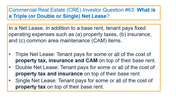
Essex Property Trust 3Q Results - pretty, pretty good.
Key observations:
- Strong operational performance in occupancy, rent, NOI and cash collections. Trends at Essex improved heading from 3Q into October. While on a cash basis (allocation of free rent to period where free rent was borne by ESS), NOI was down a little over 10% but on GAAP/ straight line basis (amortize free rent over duration of lease, consistent with EQR/AVB), same store NOI was down just 5.5%. This is much better than EQR & AVB which reported 8.4% and 10% declines, respectively for their same store portfolios. Essex benefits from high suburban exposure (low exposure to urban core), having mainly Class B assets which are attractively priced relative to A assets and having superior management.
- ESS reported notably higher occupancy than EQR/AVB. Seeing strong demand for properties as evidenced by 96.6% October same store occupancy (vs. 96% at 9/30/20 and 94.9% at 6/30/20 and 96% at 9/30/19). October occupancy at ESS was 250 bps higher than EQR and AVB, reflective of its largely suburban, class B portfolio. This is aided by management’s focus on keeping units full, particularly as we are now in the seasonally weak 4Q.
- Cash collections were strong at 97.3% during the Q an improvement from 2Q. Delinquencies fell further in October with cash collection at 97.8%. Given conservative bad debt accounting, it is possible we may see some writebacks here should ESS collections of bad debt exceed provisions.
- Management at ESS/EQR sounded optimistic that Prop 21 (rent control) will fail.
- There is some double whammy negative impact in NOI as: 1) effective rents declined low single digits and cash collections, while very strong are still negatively impacted by the pandemic/eviction moratorium (coupled with conservative recognition by ESS mgmt) 2) expenses are elevated due to the pandemic - for example, work from home has increased utility costs. In addition while 2Q benefitted from lower expensed maintenance, as tenants were reluctant to allow maintenance technicians in their homes (greater fear of COVID), 3Q saw a spike as a result of a ‘catch up’ in unit maintenance (as infection fears subsided a bit). I suspect we may see some moderation in these expenses as workers return to offices and maintenance gets caught up.
- While 4Q20-2Q20 will likely show continued declines in YoY NOI (gain to lease, or in-place rent roll vs. current estimated market rent is mid 3s), so negative rent roll will take a couple Qs to work its way into #s, ESS mgmt is cautiously optimistic that we could see an inflection in results in 2H21. The overall tone of the earnings call was notably more optimistic than EQR.
- Given persistently strong demand, Essex used fewer incentives in October than it had offered in 3Q. Similarly, rental rates have improved in October vs. 3Q. New lease rates in October were just -3% year over year and blended rates are just -2.5% (compare favorably to 3Q which saw new leases -5.8% and blended -3.8%). This is in contrast to EQR and AVB which saw continued deterioration of effective rents through the quarter and into October, weighed down by greater urban exposure.
- Private market appetite to buy apartment assets remains strong. Essex sold a Glendale CA property after the close of 3Q at a price over $500k per unit or a 3.8% on pre-pandemic NOI (4% above ESS mgmt's estimate of value pre-pandemic).
- Overall, Essex says that while apartment buy/sell transactions are certainly down YoY, based on private market prices of what has transacted, the value of suburban assets (the vast majority of the ESS portfolio) is flat to up. ESS management said that early indications from the private market are that the value of urban core assets has declined 5-10%. Financing is very attractive with 7 year fixed mortgages from Fannie/Freddie in the mid 2s. AVB/EQR noted that suburban properties have seen stable valuations despite COVID but that urban assets are not trading. On its call, AVB mgmt highlighted low interest rates and strong buyer demand has lead it to increase dispositions - it has 6 suburban assets under contract/in LOI stage at a 4.4% cap rate. Buyer appetite in the the private market remains strong for suburban assets. The private market is the real market as only 5% of apartment assets in the US are owned by REITs.
- Overall ESS mgmt is optimistic about a strong economic recovery in its markets with LA being set to recover from a) Hollywood shutdown - shoot days were -54% YoY in 3Q20 vs. 2019 and (b) rebound in tourism. Aimco (AIV) also noted a pickup in applications recently in LA area. While many SF Bay area tech companies have indicated that work from home will play a greater role on a permanent basis, ESS management expects that because of the importance of collaboration this will be a hybrid model where most employees continue spend some time in the office.
- Also noted the importance of having offices as being necessary to instill corporate culture which I think makes a lot of sense. Further, while the SF Bay area has been a tough place to live in 2020 with all the pandemic related shut downs, many businesses/experiences have reopened in the past month (offices starting to open too) which is restoring the overall attractiveness of the area as a place to live and work.
- Management noted that with rents holding up well in suburban areas of LA/SF/Seattle but declining in the urban core, value seekers have increased interest in urban properties (EQR noted an uptick in applications). This could bode well for EQR/AVB in boosting occupancy. Additionally, while EQR/AVB have been harder hit (and are likely to see rougher 4Q20/1Q21), they may be poised for a stronger recovery as interest in urban living increases.
- The price to purchase residential housing in LA/SF/Seattle has continued to increase - this reduces the ability of renters to purchase homes and further increases the monthly price differential between renting and owning. This also bodes well for potential value creation from condo conversion (~16% of ESS's apartment units have condo conversion rights).
Every time I listen to Mike Schall & Co describe the way that they operate the business and allocate capital, I am impressed and this call (and set of results) was no exception.
I maintain my original fair value estimate of $350 per unit (based on estimated 2023 NOI @ 4% cap rate).
Eric Bokota owns ESS, EQR, AVB, AIV. As always, this is not investment advice. It's entirely possible there is a factual error somewhere above. Do your own work.
Private Eye Capital Newsletter
Join the newsletter to receive FREE actionable investment ideas.





